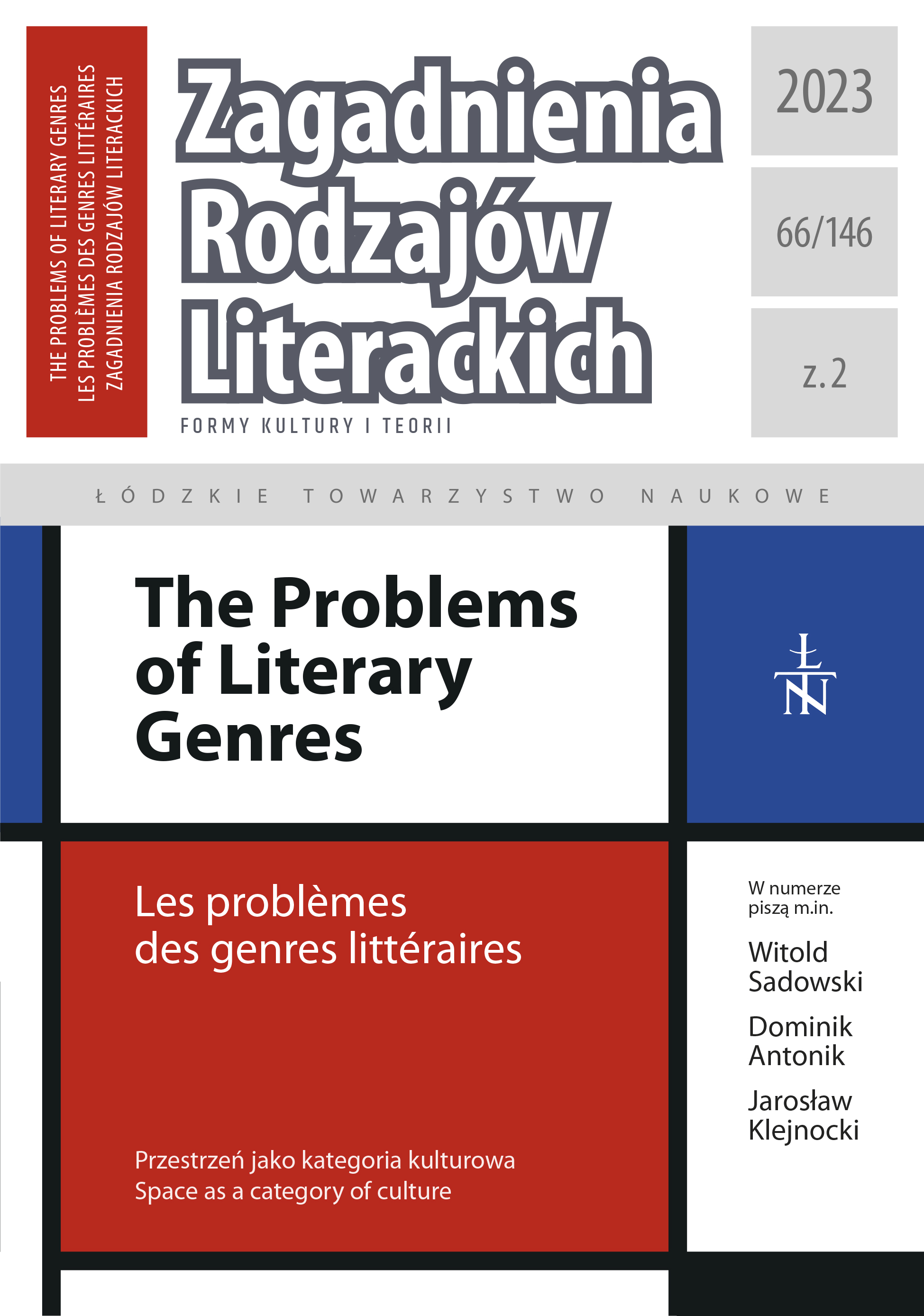Przestrzeń dyskomfortu w filmach Rubena Östlunda
DOI:
https://doi.org/10.26485/ZRL/2023/66.2/9Słowa kluczowe:
Ruben Östlund; film; space; the Cinema of Discomfort; heterotopiaAbstrakt
The author analyzes a selection of Ruben Östlund’s feature-length films in terms of the presence of discomfort space in them. In doing so, he refers, first to the notion of “discomfort cinema” proposed by Geoff King, but also sets the analyzed works in the context of the concept relating to feel-bad films, as presented by Nikolai Lübecker, and to strategic disorientation, a technique of postmodern cinema, as described by Andrzej Zalewski. The author of the article notes that discomfort in Östlund’s films occurs on at least three levels: the level of the diegetic characters, the viewer watching the film, and is present in the cinematic means used by the director, such as wide sets, long takes, static camera and frequent use of off-screen space. The basis for such oriented research will be the concept of spatial turn, humanistic geography, and the starting point will be geographical place functioning in various contexts (social, cultural, historical). The article also proposes a division of space in the Swedish director's films into the space of nature, public space, and heterotopia (Foucault), in the context of which there are also references to the concept of non-places (Augé). As for the analyses of the film itself, they are based largely on textual analysis derived from general structural analysis, which means that the author treats the film as a text, and this text is a “realized unit of discourse.” In conclusion, the author also points out that space in the Swedish director’s films can be read allegorically, as a critique of the modern welfare state, or consumer society
Liczba pobrań
Bibliografia
Augé Marc (2008), Nie-miejsca. Wprowadzenie do antropologii nadnowoczesności: fragmenty, przeł. A. Dziadek, „Teksty Drugie” nr 4(112).
Barbalet Jack (2008), Konformizm i wstyd [w:] Socjologia codzienności, red. P. Sztompka, M. Bogunia- Borowska, Wydawnictwo Znak, Kraków.
Bordwell Dawid, Thompson Kristin (2010), Sztuka filmowa: film art. Wprowadzenie, Wydawnictwo Wojciech Marzec, Warszawa.
Brzozowski Grzegorz (2023), Rzekomo fajny film. Recenzja „W trójkącie” w reżyserii Rubena Östlunda, „Kultura Liberalna” nr 732, https://kulturaliberalna.pl/2023/01/17/rzekomofajny-film-recenzja-w-trojkacie-w-rezyserii-rubena-ostlunda [dostęp: 16.10.2023].
Cobel-Tokarska Marta (2012), Przestrzeń społeczna: świat — dom — miasto [w:] Krótkie wykłady z socjologii. Przegląd problemów i metod, red. A. Firkowska-Mankiewicz, T. Kanash, E. Tarkowska, Wydawnictwo Akademii Pedagogiki Specjalnej, Warszawa.
Copik Ilona (2017), Topografie i krajobrazy: filmowy Śląsk, Wydawnictwo Uniwersytetu Śląskiego, Katowice.
Copik Ilona, Skowronek Bogusław (2020), Filmowe doświadczanie miejsc. Kilka zdań wstępu, „Annales Universitatis Paedagogicae Cracoviensis. Studia de Cultura” t. 12, nr 1.
Czaja Dariusz (2013), Nie-miejsca. Przybliżenia, rewizje [w:] Inne przestrzenie, inne miejsca. Mapy i terytoria, Wydawnictwo Czarne, Wołowiec.
Eliade Mircea (2001), Czas święty i mity [w:] Antropologia Kultury. Zagadnienia i wybór tekstów, red. G. Godlewski, L. Kolankiewicz, A. Mencwel, M. Pęczak, Wydawnictwo Uniwersytetu Warszawskiego, Warszawa.
Foucault Michel (2005), Inne przestrzenie, przeł. A. Rejniak-Majewska, „Teksty Drugie” nr 6(96).
Gullette Christian Mark (2018), Challenging Swedishness: Intersections of Neoliberalizm, Race, and Queerness in the Works of Jonas Hassen Khemri and Ruben Östlund, ProQuest LLC, University of California, Berkeley.
Jędrzejczyk Dobiesław (2004), Geografia humanistyczna miasta, Wydawnictwo Akademickie Dialog, Warszawa.
King Geoff (2022), The cinema of discomfort. Disquieting, awkward and uncomfortable experiences in contemporary art and indie film, Bloomsbury Publishing, Nowy Jork.
Konefał Jakub Sebastian (2018), Opowieści smartfonowe: Strategie autorskie w filmach Rubena Östlunda, „Kwartalnik Filmowy” nr 101–102.
Kronenberg Anna (2014), Geopoetyka. Związki literatury i środowiska, Wydawnictwo Uniwersytetu Łódzkiego, Łódź.
Larsson Mariah, Marklund Anders (2010), Swedish Film: An Introduction and a Reader, Nordic Academic Press, Lund.
Loska Krzysztof (2018), W co gra Ruben Östlund?, „Kwartalnik Filmowy” nr 101–102.
Lübecker Nikolaj (2015), The Feel-Bad Film, Edinburgh University Press, Edynburg.
Łacina Alicja (2017), Od nie-miejsc hipernowoczesności do nie-miejsc pamięci [w:] Emocje — Miejsca — Literatura, red. D. Saniewska, Wydawnictwo Libron, Kraków.
Makedonas Eleftherios (2019), Mocking the „Civilized” viewer — chimpanzee — Ruben Östlund’s The Square, KOSMORAMA, www.kosmorama.org/square [dostęp: 31.07.2023].
Myga-Piątek Urszula (2012), Krajobraz kulturowy. Aspekty ewolucyjne i typologiczne, Wydawnictwo Uniwersytetu Śląskiego, Katowice.
Rembowska Krystyna (2013), Kultura w badaniach geograficznych [w:] Geografia w ujęciu humanistycznym. Wybór prac Krystyny Rembowskiej, red. A. Suliborski, Wydawnictwo Uniwersytetu Łódzkiego, Łódź, HANDLE: 11089/30137.
Robinowitz Christina Johansson, Carr Lisa Werner (2001), Modern-day Vikings. A practical Guide to Interacting with the Swedes, Intercultural Press, Boston–Londyn.
Rybicka Elżbieta (2014), Geopoetyka. Przestrzeń i miejsce we współczesnych teoriach i praktykach literackich, TAiWPN Universitas, Kraków.
Stobiecka Monika (b.r.), Heterotopia [hasło], Kulturowe Studia Krajobrazowe, http://studiakrajobrazowe.amu.edu.pl/vocabulary_tag/heterotopia [dostęp: 19.10.2023].
Szczepański Tadeusz (2020), Kino Nordyckie, Szkoła Filmowa w Łodzi, Łódź.
Tuan Yi Fu (2005), Ciało, relacje międzyludzkie i wartości przestrzenne [w:] Antropologia kultury. Zagadnienia i wybór esejów, red. A Mencwel, Wydawnictwa Uniwersytetu Warszawskiego, Warszawa.
Urry John (2007), Spojrzenie turysty, przeł. A. Szulżycka, Wydawnictwo PWN, Warszawa. Wstęp do kulturoznawstwa (2007), red. E. Baldwin, B. Longhurst, S. McCracken, M. Ogborn, G. Smith, przeł. M. Kaczyński i in., Zysk i S-ka, Poznań.
Zalewski Andrzej (1998), Strategiczna dezorientacja. Perypetie rozumu w fabularnym filmie postmodernistycznym, Instytut Kultury, Warszawa.
„Zwroty” badawcze w humanistyce. Konteksty poznawcze, kulturowe i społeczno-instytucjonalne (2010), red. J. Kowalewski, W. Piasek, Instytut Filozofii Uniwersytetu Warmińsko-Mazurskiego, Olsztyn.
Pobrania
Opublikowane
Jak cytować
Numer
Dział
Licencja
Prawa autorskie (c) 2023 Łódzkie Towarzystwo Naukowe i autorzy

Utwór dostępny jest na licencji Creative Commons Uznanie autorstwa – Użycie niekomercyjne – Bez utworów zależnych 4.0 Międzynarodowe.







